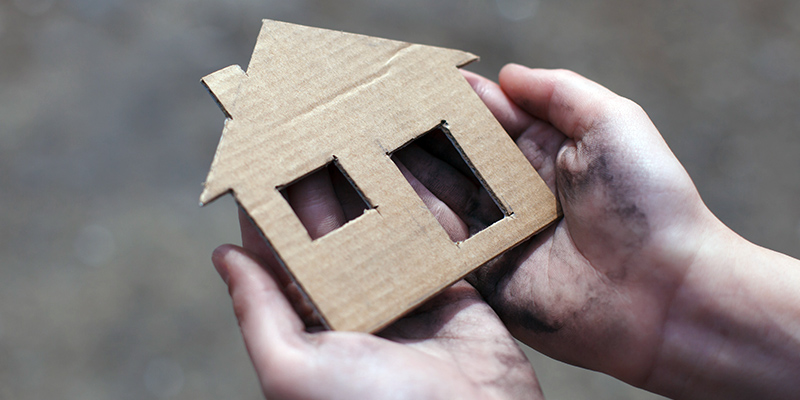How To Prevent Squatters In Foreclosed Homes In HOA Communities

Foreclosed homes are nothing new to homeowners associations, but they can become a real problem when squatters start making these homes their own. If that sounds all too familiar to you, read on to learn how to prevent squatters and how to remove them legally.
Browse By Category
Sign up for Our Newsletter
Foreclosed homes are nothing new to homeowners associations, but they can become a real problem when squatters start making these homes their own. If that sounds all too familiar to you, read on to learn how to prevent squatters and how to remove them legally.
How to Prevent Squatters from Taking Over Your HOA
Believe it or not, squatters are everywhere. Between foreclosures brought on by unpaid mortgages and those initiated by homeowners associations for delinquent dues, squatting in foreclosed homes has become quite the phenomenon.
If your HOA has a few abandoned homes in your neighborhood, it’s worth taking action to prevent squatters from occupying them. Putting up “no trespassing” signs is a step in the right direction, but a more effective way is to make sure the property remains secure from the outside. This way, squatters can’t gain entry into the foreclosed property.
If you live in a gated community, you might benefit from increased security controls. While this can prevent outsiders from potentially squatting in your HOA, it may not work against those who refuse to leave their former property after it has been foreclosed.
Preventing squatters is one thing, but removing them is another thing entirely. Once you already have squatters in your HOA community, it can quickly get complicated.
Homeowners associations generally have limited rights when it comes to dealing with squatters. You might ask, “Can you change locks on squatters?” While that may seem like an easy solution, HOAs normally don’t possess the authority to do so. When a home is in foreclosure, the banks own it. Therefore, they have the right to change the locks and secure the property.
Squatters vs Trespassers
 Before learning how to get rid of squatters next door, you must first understand the difference between squatting and trespassing. Squatting is the act of occupying a vacant property with the intention of living in it. It usually involves bringing personal belongings to make the place their own. In contrast, trespassing is the act of breaking into private property, usually a property with tenants, with no intention of living in it.
Before learning how to get rid of squatters next door, you must first understand the difference between squatting and trespassing. Squatting is the act of occupying a vacant property with the intention of living in it. It usually involves bringing personal belongings to make the place their own. In contrast, trespassing is the act of breaking into private property, usually a property with tenants, with no intention of living in it.
Can police remove squatters? If the act resembles trespassing more than squatting, then you can definitely call the police. Trespassing is a crime, so the police can help you remove the trespasser from the premises. If the person is squatting, though, the police may direct you to other means of resolving the matter since it’s more of a civil matter than a criminal matter.
Understanding Squatters’ Rights
What are squatters’ rights? When people talk about squatters’ rights, they are usually talking about adverse possession. Adverse possession refers to the principle wherein a person can come to legally own property after extended occupancy and use.
To qualify for adverse possession, squatters will usually need to live on the property for a minimum number of years. They must also use the property as if they were the real owner, such as paying property taxes and utilities as well as maintaining the property itself. Not all states allow adverse possession, though, and the criteria by which the second requirement is judged will depend on the jurisdiction.
Why do squatters have rights? At first glance, you might think squatters are, in essence, stealing property through adverse possession. But, this concept does serve a purpose — to prevent properties from going to waste as a result of owner abandonment or neglect. You should know, though, that adverse possession is extremely rare.
The Wrong Way to Remove Squatters in Your HOA
Beyond learning the proper way to get rid of squatters, you must also know how to remove squatters the wrong way. By knowing what you can’t do, you can protect your HOA from potential liability.
These are actions that you absolutely can’t do in an attempt to remove squatters living in foreclosed homes:
- Cut power to the property;
- Turn off utilities for the property;
- Threaten, intimidate, or abuse the squatter/s in any way, shape, or form; and,
- Use violence against the squatter/s.
All of these options are illegal and can land you as well as the association in trouble with the law. Tempting as it might be, you must remain calm and approach the situation with a level head.
How to Get Rid of Squatters in Foreclosed Homes
Homeowners associations are not totally powerless when it comes to squatting. Here’s how to get rid of squatters in your neighborhood in a legal manner:
1. Notify the Owner
While the HOA doesn’t have much authority over squatters, you can notify the property owner of the issue. Let them know that intruders have shacked up in their homes. If the property is in foreclosure, let the banks know.
In some cases, after the foreclosed home has been purchased by a new owner, the former owner will remain in the house and refuse to leave. When this happens, the new owner can send a notice to quit to the former owner. That might work, but the new owner may also need to serve the former owner with a Summons and Complaint for Unlawful Detainer, depending on state law.
2. Amend Your Governing Documents
Condo associations, in particular, are generally afforded more options. Florida, for example, allows condo associations to enter units in the event of an emergency. Therefore, under Florida law, condo associations have the authority to change the locks to prevent squatters.
If your governing documents don’t already allow it, consider amending them to let your association secure abandoned homes in the neighborhood. You should also make sure that state laws allow you to do this.
As for homeowners associations, state laws and governing documents don’t usually give them the right to evict squatters living in foreclosed homes. But, you can try to amend your governing documents to grant the HOA that right. There’s just no guarantee that courts will find it enforceable.
3. Pay Them to Leave
This doesn’t really apply to homeowners association per se. But, it does apply to property owners with squatting problems.
Evicting someone can take time and money. Property owners might be able to skip the eviction process and remove squatters from the premises using a “cash for keys” setup. This means paying the squatter to leave the property. Though, if the squatter still refuses to leave even after getting paid, then property owners will need to initiate eviction procedures.
4. Talk to an Attorney
If your HOA encounters a squatter problem in your community, it’s best to seek legal counsel from an experienced attorney. Consulting your HOA attorney about what you can do is the safest way to make sure you don’t put the association at risk of liability.
A Real Problem
 Squatters are never pleasant to deal with, but they do exist, and they might even be living within your HOA community. By far the best way to handle them is by learning how to prevent squatters from occupying abandoned or foreclosed homes in the first place. But, if you already have squatters in your neighborhood, then this article has hopefully helped you understand how you can remove them.
Squatters are never pleasant to deal with, but they do exist, and they might even be living within your HOA community. By far the best way to handle them is by learning how to prevent squatters from occupying abandoned or foreclosed homes in the first place. But, if you already have squatters in your neighborhood, then this article has hopefully helped you understand how you can remove them.
Many HOA management companies offer legal assistance to homeowners associations as part of their services. Start your search for the best HOA management companies in your area using our online directory.
RELATED ARTICLES:
- 11 Ways To Ensure Effective Security In HOA Community
- Can Homeowners Get A Traffic Ticket In An HOA?
- 11 Things To Know Before Moving Into An HOA Community
Trending Now
Related Article
Sign up for Our Monthly Newsletter
Sign up below for monthly updates on all HOA Resource
















